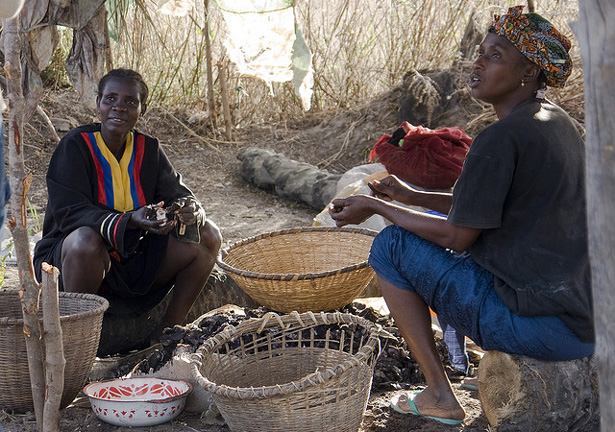Harvesting oysters has become an economic savior for local women in The Gambia. Not only have female harvesters been able to improve their economic condition, but they also have contributed to the environmental sustainability of their community. And oysters are boosting the country’s economy as well.
Currently there are nine major oyster-harvesting sites within the Greater Banjul Area. While men dominate fishing, women dominate harvesting and collecting oysters and play a key role in their processing and marketing. Indeed, so many women are involved in the oyster business in The Gambia that an advocacy and resource community-based organization, TRY Oyster Women’s Association, was formed in 2007. With more than 700 women members to date, TRY also teaches women how to balance sustainable harvesting of oysters and cockles with management of the fragile mangrove ecosystems.
Oyster harvester Fatou Janha Mboob started TRY with 50 other female harvesters. USAID began to lend support the same year with much-needed funding and management. The BaNafaa project came along through a cooperative agreement with the University of Rhode Island’s Coastal Resources Center and the World Wide Fund for Nature’s Western African Marine Ecoregion program, in cooperation with The Gambia Department of Fisheries. BaNafaa works closely with TRY.
In an exclusive interview with AfricaStrictlyBusiness.com, Karen Kent, senior coastal manager, Coastal Resources Center in the Graduate School of Oceanography, University of Rhode Island, and team leader for the Gambia-Senegal Sustainable Fisheries Project (BaNafaa), explained that the cockle and oyster fishery was identified as a potential focal fishery for project support during the initial scoping phase of the USAID-funded Gambia-Senegal Sustainable Fisheries Project (USAID/BaNafaa Project). The project was led by the Coastal Resources Center from 2009 to 2014.
“In addition to the fact that the fishery is strongly linked to ecosystem biodiversity in zones of biodiversity significance, the oyster harvesters are among the most vulnerable social and economic groups. They are primarily women who are the sole or primary breadwinners for their households,” Kent said.
She noted that the university got involved because of the progress it afforded women. “Both the fishery and the women harvesters were ‘invisible.’ The Department of Fisheries was not including oysters in its portfolio of fisheries that it tracked and managed, and no support or assistance was provided to the oyster harvesters,” Kent explained.
“Another important factor was that the TRY Oyster Women’s Association formed in 2007 was beginning to organize these isolated women and their communities to work together to improve their economic situation and to reverse negative trends in order to protect the natural resources upon which their livelihoods depend,” she said.
In addition, since 2007 The Gambia has been one of the few West African countries with the legal framework in place under its Fisheries Act to enable co-management and the granting of exclusive-use rights, but no Fisheries Management Plans implementing these authorities had yet been developed.
“The work that TRY has been doing and the assistance that URI has been able to provide through the USAID/Ba Nafaa Project is important because economically vulnerable, isolated, and socially marginalized resource users are now pro-active leaders and decisionmakers for the sustainable management of The Gambia’s oyster and cockle resources,” Kent points out. “It is the first time in Sub-Saharan Africa that a women’s association has been granted exclusive-use rights to a fishery by a national government.”
The Cockle and Oyster Fishery Co-Management Plan for the Tanbi Wetlands National Park granting these rights as well as management responsibilities to TRY Oyster Women’s Association was developed through a participatory, ecosystem-based process that considered economic, social, environmental and biological factors.
“In the context of climate change adaptation, this effort and the model it demonstrates for stakeholder engagement in coastal mangrove ecosystem conservation are also important. TRY’s efforts aim to preserve and enhance the ecosystem services provided to resource users and to society at large, including those that will increase resilience to climate change impacts, i.e., reducing coastal erosion and flooding among others.” Kent said.
Oyster harvesting in The Gambia is characterized by dangerous and very poor working conditions, she explained. It is seasonal, has very low economic returns, and is dominated by poor, marginalized women because they lack other opportunities that are more favorable. And the declining economic viability of even this opportunity due to environmental degradation and overexploitation of the oyster habitat as more people enter this open access fishery leaves these women even more vulnerable.
However, “the achievements made since TRY was established in 2007, and with the assistance of the USAID/BaNafaa Project since 2009, have given the women the legal authority and developed their capacity to play a decision-making role for the sustainable management of the oyster and cockle resources and, thus, their livelihoods,” Kent said.
In addition to management measures to preserve oyster habitat and reduce overexploitation, sustainable management also includes value chain improvements that can improve the quality of the product, preserve the product for marketing year round and route a higher percentage of the harvest to higher value markets. Because in The Gambia the women are themselves the harvesters, the processors and the marketers, they benefit directly from any increased returns as a result of these improvements.”
While USAID/BaNafaa Project ended in 2014 on a successful note, there are still many goals ahead for TRY, Kent said. Priorities include expansion of membership; coverage of participatory, ecosystem-based, rights-based oyster and cockle co-management planning within The Gambia and with women oyster-harvesting communities in neighboring countries; further capacity development for organizational and financial sustainability; and capacity building to develop and implement its business model for value chain improvements.
“The University of Rhode Island would like to continue to provide needed support to the TRY Oyster Women’s Association and oyster and cockle fishery stakeholders in The Gambia to strengthen and build on achievements to date to realize their objectives of a sustainable fishery and sustainable fisheries livelihoods,” Kent said.













